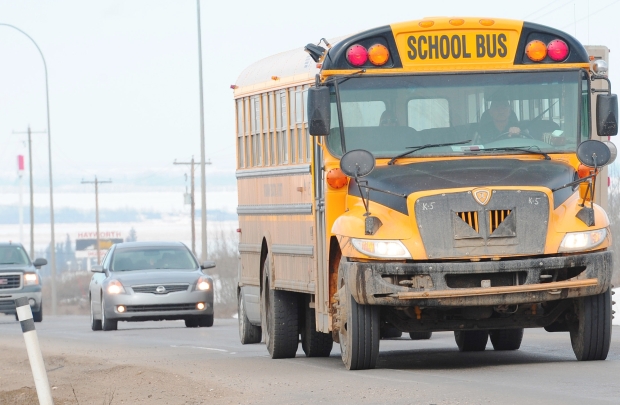EDMONTON – School bus fees will rise this fall in some Alberta school districts and routes could be cut to make up for a provincial fuel subsidy that was eliminated starting Monday, school officials say.

As school trustees grapple with how to make up the shortfall, the Alberta School Councils’ Association is urging parents to express their thoughts to local boards. Parents in some districts with high busing fees would likely protest a fee hike, while others who pay minimal fees might accept an increase, Alberta School Councils’ Association president Brad Vonkeman said Tuesday.
“I know there’s some other school boards looking at joining forces, with the separate and the public school boards combining busing to try to reduce some of those costs,” said Vonkeman. “I know my district is looking at changing some of the start times of the schools so they can run fewer buses and double-route them … so there’s some creative options out there.”
School trustees with Greater St. Albert Catholic Schools and Elk Island Public Schools have already approved bus-fee increases for September and other boards are poised to raise fees as well, after last months’ provincial budget ended a $22-million grant program that helped school districts pay for fuel.
The fuel price contingency was eliminated starting April 1, leaving most school districts to cover the shortfall until this school year ends in June.
That leaves Parkland School Division to absorb about $170,000 for this school year. The school district won’t raise fees now to offset that loss, said board chair Richard Gilchrist. Trustees will decide at a special meeting in just over two weeks whether to raise school bus fees for September. The grant cut will cost Parkland about $570,000 for next year, Gilchrist said.

Get breaking National news
Students who live within 2.4 kilometres of their school pay about $200 a year, or a family maximum of $400 a year, for busing. The district would have to double their fees to make up the difference, “and honestly, I don’t think that’s a tenable situation,” Gilchrist said. Trustees could consider charging fees to the students living outside the 2.4-kilometre busing boundary or implementing some kind of fuel surcharge for bused students, he said.
“If we charged a fuel surcharge to every rider, it would be somewhere around $40,” he said. “The board has not had an opportunity to look at that yet but we’ll certainly be considering that and other options … It’s a lose-lose situation because you’re going to be, in some way or other, taxing children to ride a bus.”
The school district already co-operates with several neighbouring school districts to share busing and contain costs, he said. “We actually are set up in the kind of model the province wants to see across the province. We’ve been operating that way now for about 15 years, so we’re probably running about as efficiently as we possibly can now, in terms of this region. We’re the only busing authority, so there’s no duplication of service anywhere.”
Students with Greater St. Albert Catholic Schools will pay an average of $3 or $4 more per month to ride the school bus starting in September, after that school board approved transportation fee increases, according to communications manager Carol Bruineman.
Elk Island Public Schools bus fees will go up $50 for students who live within 2.4 kilometres of their designated school, from $275 to $325 per student and from $750 to $800 for the family maximum, said that district’s chief financial officer Scott McFadyen. Students busing to programs of choice will pay $350 instead of $300, with a family maximum of $800, he said.
The fee hikes will bring in $102,000 but doesn’t come close to covering the $700,000 loss from the fuel grant cut, McFadyen said. Elk Island Public Schools is looking at sharing bus service with neighbouring districts. The remaining shortfall could be covered by cutting 10-12 bus routes. Each route eliminated saves about $50,000, he said.
In the Fort McMurray Public School District, administrators will recommend options to trustees that could include fee adjustments, route changes or cuts or reallocating funding from other areas to cover a $60,000 shortfall from the grant cut, said chief deputy superintendent Phil Meagher.
That school district was already dealing with a projected $4.4-million operating deficit. In February, the district considered a compressed school week in which students wouldn’t have school on some Fridays, saving up to $1 million, much of it from reduced busing costs.
The Edmonton Catholic and public school boards have not yet determined what effect the loss of the fuel grant will have on their upcoming budget discussions.
The grant is worth an estimated $544,000 for Edmonton Catholic Schools, said manager of student transportation services Debbie Hunter.
Provincial estimates say it’s worth nearly $1 million to Edmonton Public Schools.
The Alberta Student Transportation Advisory Council is disappointed the grant was cut after the province had only recently reinstated it, said Sue Fowler, chair of the council that’s made up of school district transportation officials and contractors.
“In 2010, when it was taken out, we had huge meetings … and were notified that funding would be put back for 2012 and now we’ve lost it again,” Fowler said.
Transportation is a huge expense for school districts, said Alberta School Boards Association president Jacquie Hansen.
“If you don’t have a reserve (fund) and costs are going up and there’s no relief on fuel, you have to make decisions like increasing bus fees,” Hansen said. “If we’re pulling money from our reserves to pay for transportation, that takes money out of the classroom. We really have to figure out where else we can get the money and get our kids to school.”







Comments
Want to discuss? Please read our Commenting Policy first.